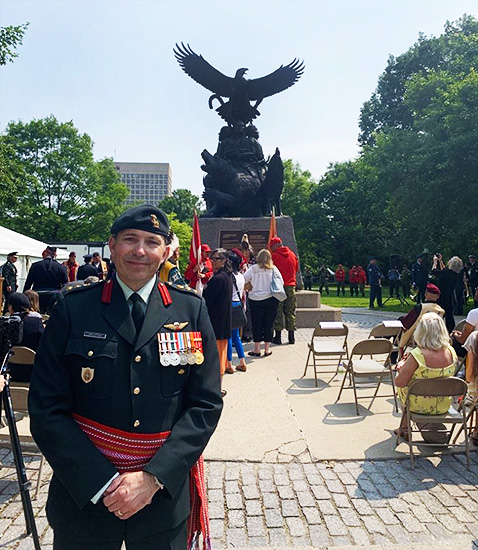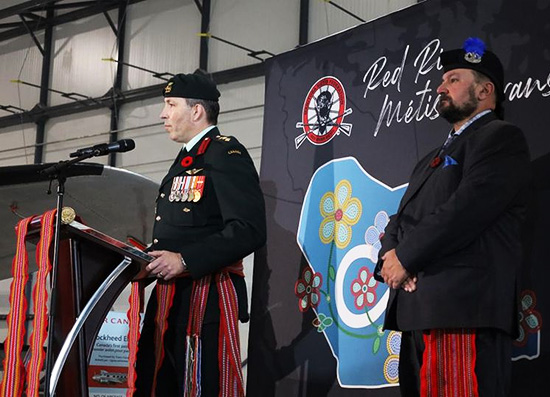Understanding history is key to Reconciliation for Métis Officers
November 8, 2023 - Canadian Army

Caption
Colonel (Col) David Grebstad currently serves as both the Canadian Army’s Director of Personnel Management and Regimental Colonel of the Royal Regiment of Artillery.
Colonel (Col) David Grebstad currently serves as both the Canadian Army’s Director of Personnel Management and Regimental Colonel of the Royal Regiment of Artillery. He only very recently discovered his Métis heritage.
To mark Indigenous Veterans Day, Col Grebstad shared that story, along with his thoughts on advancing Reconciliation through the study of history, and the warm welcome he has received from his Métis community.
How did you discover your Métis heritage?
I did not know I was Métis until I was 45 years old. So, I lived my entire life not knowing. My mom passed away when I was 45. I was deployed to Egypt at the time. She had been the family historian and when I came home for the funeral, I said, ‘I’ll take that on.’ So, I started looking into things. My fifth great grandmother was a Cree from northern Manitoba. As I did more research, I realized they were Métis. I became very interested, but also very upset that I had lived 45 years of my life without knowing. And so, I said, ‘I'm going to make up for lost time and I'm going to jump in with both feet, embrace this culture and learn more about it.’
How has it impacted you?
What's really impacted me is the warm embrace that I've received from the Manitoba Métis. I've spoken to various members in the Manitoba Métis Federation government, and my situation isn't unique. A lot of people, not so much now, but in the first half and the middle of the 20th century were shamed for being Métis, so they deliberately downplayed their heritage. Whether or not that’s what happened in my case, I don't know, but I've been welcomed into the community and supported.
Why should all Canadians educate themselves on Indigenous history?
I think it's a part of a wider effort at Reconciliation. Indigenous Peoples are an important part of our society. They have a lot to offer to the Canadian Armed Forces. Sadly, we don't have enough Indigenous Peoples within our ranks. We certainly don't have them in the proportions that are representative of their share of the population. There are a lot of reasons for that, colonialism and some of our national history, but if non-Indigenous people in the Forces can learn more about Indigenous cultures, the organization will become far more welcoming, and I think there will be a lot less reluctance among Indigenous Peoples who might want to join.
The Manitoba Métis Federation has invited you for the second time this year to be part of their Remembrance commemorations. What does that opportunity mean to you?

Caption
Col Grebstad shared his thoughts on advancing Reconciliation.
To be invited to attend and to speak both last year and this year is incredibly touching. The last time the Canadian Army fired in anger on Canadian soil was against Métis. So, the Métis people have more than enough argument to not like the Canadian Forces. However, the President of Manitoba Métis Federation, David Chartrand, is very, very supportive of Métis joining the Canadian Forces. He is very supportive of celebrating and respecting all veterans. The fact that they're holding these ceremonies is a great indicator of Reconciliation in itself.
Indigenous Veterans Day is an opportunity to honour the contribution Indigenous Veterans have made in service of Canada, even when it did not always grant them a fair treatment. To honour Indigenous Veterans Day, all are invited to take the time to remember Indigenous veterans and learn more about their tremendous contributions to Canada’s defence. More information on Indigenous Veterans can be found here.